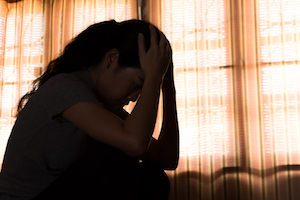 On May 6th, maternal mental health organizations around the globe will be joining forces to raise awareness during World Maternal Mental Health Day which falls on the first Wednesday of May each year. Advocates say there is a lack of universal screening and access to treatment for pregnant women, new mothers, and also new fathers and partners who may also be suffering from a perinatal mental illness.
On May 6th, maternal mental health organizations around the globe will be joining forces to raise awareness during World Maternal Mental Health Day which falls on the first Wednesday of May each year. Advocates say there is a lack of universal screening and access to treatment for pregnant women, new mothers, and also new fathers and partners who may also be suffering from a perinatal mental illness.
This year is of particular concern due to the pandemic and the increasing isolation new mothers may be feeling as they comply with government orders to physically distance themselves from others, including supportive friends and family.
Antoline Quiceno’s infant was two-and-a-half months old when the pandemic began.
“I’m at home like many other people,” Quiceno told us. “t’s hard for many people who don’t get to see their family.”
Quiceno’s infant is now 16 weeks.
“They grow so fast,” Quiceno told us. “I took out the cloths that he wore home from the hospital and it does for him now but I remember it being way to big for him that. I cried.”
Quiceno is suffering from postpartum depression, a maternal mental illness that affects one in five new mothers worldwide. Quiceno told us the sadness and suicidal thoughts she's been having forced herself to reach out for help.
“I was put on a list to see a psychiatrist but I haven’t been able to get an appointment,” Quiceno told us. “I haven’t gotten a phone call yet. They said there was a four month wait.”
Quiceno said she started to notice she wasn’t feeling well mentally after not being able to produce enough breast milk.
“I really wanted to give breast milk,” Quiceno told us. “I spent hours pumping and wasn’t producing enough. I got upset with myself that I couldn’t do it which made me sad. But I think the worst part of it was when I returned home.”
Not getting the support she needed from extended family prior to the pandemic only increased Quiceno’s feelings of isolation.
“My mother-in-law came to live with me and started to tell me how to raise my child,” Quiceno told us. “I started to lose confidence and didn’t see myself as a good mother. I started falling into a deep pit. I was sad and having negative thoughts such as ‘I am not good enough’ and ‘I am a bad mother’.”
To make matters worse, her husband didn’t understand what she was going through. He took his mother’s side instead of supporting Quiceno.
“This brought about deep emotional pain,” Quiceno told us, “which lead to thoughts of not wanting to be alive.”
Then came the pandemic.
“I have moments of sadness and I’m scared of hurting my son,” Quiceno told us. “I want to meet with a psychiatrist to try and get the help, at least talk to someone but I haven’t heard back. I guess access to treatment is limited now.”
Quiceno told us her husband now supports her and she in constant contact with her mother and sister who are providing tremendous emotional support for her while she deals with postpartum depression and a pandemic.
“I’m just blessed I have a supportive family,” Quiceno told us. “I don’t know how other moms are getting through it all right now.”
While many practitioners have moved their services online, the waiting lists haven’t diminished. What has increased are online support groups delivered by maternal mental health organizations such as Postpartum Support International who are providing online support groups for new moms every Tuesday. The Postpartum Stress Center is also offering online support.
Patricia Tomasi is a mom, maternal mental health advocate, journalist, and speaker. She writes regularly for the Huffington Post Canada, focusing primarily on maternal mental health after suffering from severe postpartum anxiety twice. You can find her Huffington Post biography here. Patricia is also a Patient Expert Advisor for the North American-based, Maternal Mental Health Research Collective and is the founder of the online peer support group - Facebook Postpartum Depression & Anxiety Support Group - with over 1500 members worldwide. Blog: www.patriciatomasiblog.wordpress.com
Email: tomasi.patricia@gmail.com